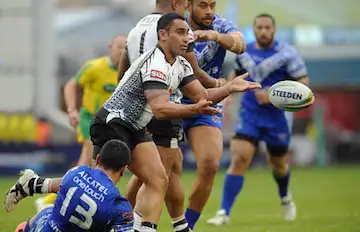NRL moves in on rugby union to take over the Pacific

Rugby league’s growing ambition in the Pacific has been dismissed by its rival code, with the International Rugby Board (IRB) announcing that it remains “confident of rugby union’s place” in the region.
Recently, NRL CEO Dave Smith launched the NRL’s ‘Pacific Strategy’ aimed at strengthening rugby league and building stronger business and community ties in the Pacific island region.
Smith courted the business community in Samoa in August. Sonny Bill Williams who has roots in Samoa, joined Smith on the trip, along with Kangaroos coach Tim Sheens.
Samoa is the first country the NRL is going in for the attack on union. Fiji and Tonga are next. The Australian’s rugby union editor Wayne Smith last week described the NRL’s Pacific Strategy as: “Nothing less than a declaration of war on rugby [union].”
Rugby union, through its history, wide reach and global governance, is, by its very nature, an international game.
Rugby league could never be as robust on the world stage, but given David Smith’s claim that 37 percent of players in NRL are already from the Pacific, growth in the region is the logical step forward.
The Pacific islands have always been rugby union’s territory. Rugby union is the most popular sport there and it has been a breeding ground for generations of representative players across the globe. But the IRB believes their current engagement with the Pacific is enough to sustain future growth and have ignored the NRL’s manoeuvring in the area.
The IRB General Manager of Oceania Will Glenwright stated there are “a variety of sports being played in the islands”, and they don’t believe that rugby league presents a threat more than any other sport.
This could be a miscalculation because the NRL is angling at the same market, and has plenty of financial muscle behind it.
In Australia, rugby league is far more commercially successful than union. The NRL’s State of Origin series currently holds the number one spot for television audience of any kind this year. And the NRL’s broadcast deal with Channel Nine and Fox is worth $1.025 billion.
Rugby union’s Super Rugby Series (equivalent to the NRL premiership series) can’t pick up a free-to-air deal.
Rugby union’s current agreement with Fox is only $25 million. Fox on-sells The Wallabies test matches to the Ten Network for just $5 million. There are rumors circulating that Australian Rugby Union (ARU) is in financial trouble.
But there are some reasons why the IRB might be sitting comfortably
The IRB’s total investment in Fiji, Samoa and Tonga, including investment in regional high performance tournaments such as the IRB Pacific Nations Cup and the IRB Pacific Cup is £21.1 million since 2009.
In 2013 the IRB launched a new global program called ‘Get into Rugby’. The Australian government has also partnered with the IRB and the ARU on the ‘Pacific in Union’ program, which is designed to improve Pacific Island communities through Rugby. Together, both programs increased participation rates by 47,800 in children aged 6-16.
The NRL has been incredibly slow to move in the pacific. Professional pathways, development programs, competition and regional governance could take many years to catch up to rugby union.
But once there, the NRL could be unstoppable. Rugby league is a more hard-hitting, fast and exuberant game.
And it’s already in the business of making Pacific Islander superstars like Lote Tuqiri, Jarryd Hayne, Manu Vatuvei, Steve Matai, Willie Tonga and Fuifu Moimoi.
At the strategy launch, Dave Smith didn’t dismiss the idea of a Pacific islands NRL team in the future. Next year, Fiji will have a representative side in the NSWRL. NRL could be ahead of the game when it comes to allowing players to feature in top level competition in the Pacific.
SANZAR, the governing body of union in the southern hemisphere and of the Super Rugby competition has shown no interest in supporting the Pacific islands to get a team bid together.
For the level of interest the region has in the sport, Polynesian players are woefully under-represented in Super Rugby. Super Rugby recently brought on its sixth South African team and Argentina for the 2016 competition.
SANZAR is in the process of deciding which of rival bids, Japan and Singapore to include as the final team for the 2016 Super Rugby season. The Singaporean bid, the ‘Asia Pacific-Dragons’ are proposing to build its team with players from Fiji, Tonga and Samoa. This could be the last hope for the Pacific to get a chance at premier league rugby union.
The winning rugby code in the Pacific will be whichever one first realises the commercial potential there, and helps to foster that, rather than sucking out its raw talent without investing in regional representation.